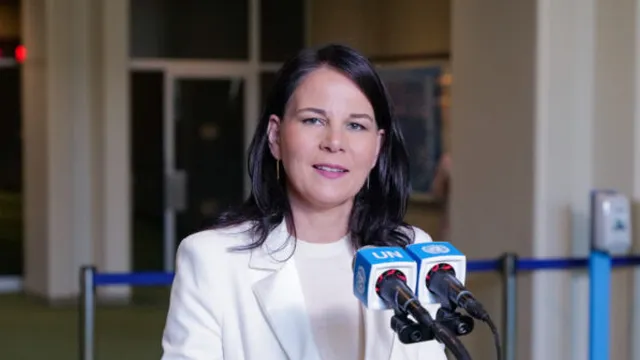
Germany's Annalena Baerbock takes presidency of U.N. General Assembly amid controversy
2025-06-03 01:13- Annalena Baerbock received 167 votes to become the new president of the U.N. General Assembly.
- Russia's deputy ambassador criticized Baerbock's candidacy as she was perceived as biased against Russia.
- Baerbock emphasized collaboration and unity during her acceptance speech, marking a challenge to bring nations together.
Express your sentiment!
Insights
In May 2023, the U.N. General Assembly convened to elect a new president for its 80th session, an event that drew significant attention due to the geopolitical climate. This election resulted in Germany's former foreign minister, Annalena Baerbock, being overwhelmingly elected to lead the assembly, securing 167 votes, far exceeding the 88 votes required for victory. Despite this resounding support, Baerbock's candidacy faced vocal criticism, notably from Russia, whose deputy U.N. ambassador accused her of incompetence and bias, claiming she had previously pursued an anti-Russia policy. Russia's demand for a secret ballot during the election further added to the controversy, yet Baerbock embraced the overwhelming endorsement from member states, asserting that she would work collaboratively in these challenging times. Baerbock is set to replace Philemon Yang, the former assembly president, commencing her term at the beginning of the upcoming session in September. The presidency of the General Assembly rotates annually by region, and Baerbock's leadership comes at a time when the assembly has been actively involved in addressing ongoing conflicts in Ukraine and Gaza. In her acceptance speech, Baerbock emphasized the theme of her presidency, which will be 'Better Together,' highlighting the precarious state of global affairs and underscoring the need for unity. She recalled the U.N.'s primary purpose, which is to prevent wars and conflicts, referring to over 120 armed conflicts occurring worldwide as a testament to the ongoing relevance of the organization's mission. U.N. Secretary-General Antonio Guterres expressed the urgency of Baerbock's presidency, indicating that the world is facing multiple challenges, including climate change, poverty, and social inequality. He called for collective action, urging nations to unite and forge combined solutions during this critical juncture. Baerbock's presidency heralds a significant chapter for the U.N., as it must navigate divisive international issues while fostering dialogue and cooperation among member states.
Contexts
Annalena Baerbock, the German Foreign Minister, has garnered significant attention and recognition through her leadership and contributions to international diplomacy. Her tenure at the United Nations General Assembly presidency reflects her commitment to addressing pressing global challenges and fostering multilateral cooperation. Baerbock's approach emphasizes the importance of dialogue, consensus-building, and collective action among nations. She has advocated for a collaborative response to issues such as climate change, global health crises, and security challenges, stressing the interconnectedness of these concerns in today's world. Under Baerbock's presidency, the U.N. has seen a renewed focus on climate action. She has championed initiatives aimed at accelerating the global transition to sustainable energy sources and enhancing international commitments to reduce greenhouse gas emissions. This includes a push for more ambitious climate targets and increased support for developing nations in their efforts to combat climate change. Baerbock’s clear vision and determination have rallied various stakeholders to unite in addressing environmental degradation, showcasing her ability to mobilize political will across borders. Furthermore, Baerbock has underscored the critical role of human rights in the international agenda. Her presidency has prioritized the protection of vulnerable populations, including refugees and displaced persons, and she has called for stronger international cooperation to uphold human dignity in the face of adversity. By promoting gender equality and advocating for the rights of marginalized groups, Baerbock has worked to ensure that human rights remain at the forefront of the U.N. discussions, highlighting their significance in achieving enduring peace and security. In summary, Annalena Baerbock's presidency at the United Nations General Assembly serves as a testament to her leadership in global affairs. Her effective advocacy for climate action, human rights, and multilateralism reflects a progressive vision for the future of international relations. As nations grapple with increasingly complex challenges, Baerbock’s commitment to collaborative solutions and her capacity to inspire collective action mark her as a pivotal figure in shaping the international dialogue for years to come.